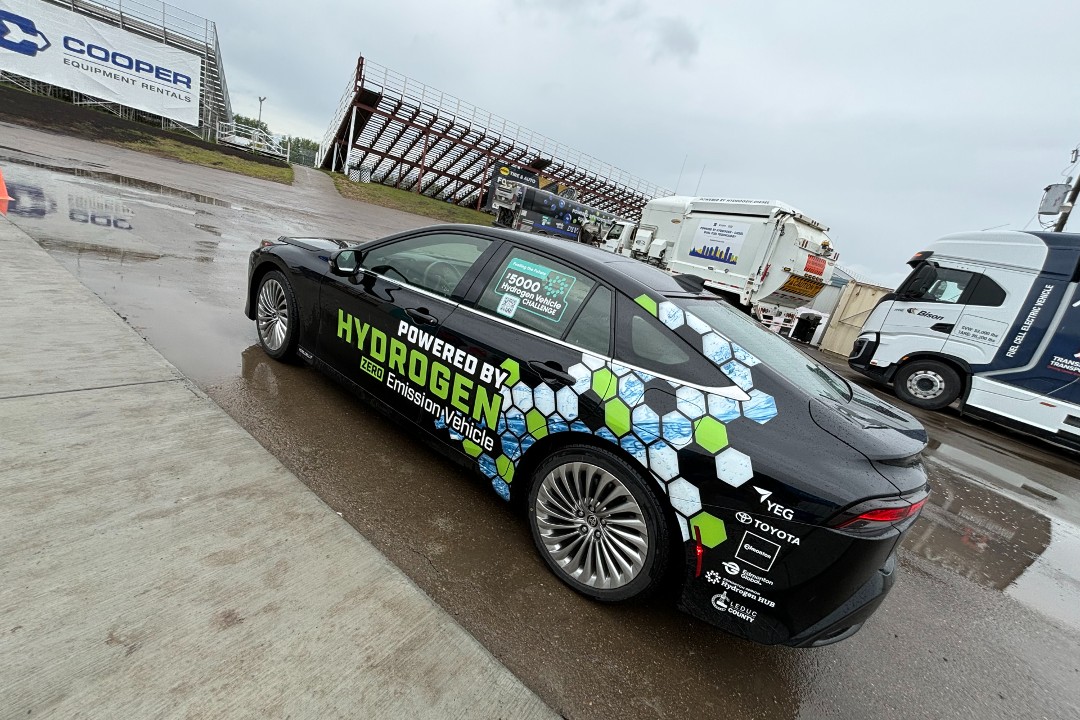
Rough summer for hydrogen car seen as part of net-zero solution
The type of hydrogen fuel-cell vehicle that the Edmonton International Airport acquired last year to help accelerate demand for the region's abundant fuel supply has recently come under fire from scientists concerned about greenwashing at the Olympics and drivers who have launched a class-action lawsuit in California.
But those behind the Edmonton region's push to incentivize a market for hydrogen vehicles with the help of 100 Toyota Mirais acquired in 2023 are confident they are on the right path, and some industry watchers suggest fuel-cells still have a shot to win the race to electrify vehicles, though they're trailing now.
In July, 120 scientists called on organizers of the 2024 Olympic Games in Paris to re-think using 500 hydrogen fuel-cell Toyota Mirais as official vehicles for the event. "We are writing to express our concern that Toyota's promotion of a hydrogen car is scientifically misaligned with net-zero and will damage the reputation of the 2024 Games," the scientists wrote. Using hydrogen's chemical energy to create power creates zero emissions, but the scientists noted that 96% of its production is based on fossil fuels, leading to accusations of greenwashing.
Meanwhile, a handful of Mirai drivers who lease the vehicle in California have launched a class-action lawsuit against Toyota. The suit alleges Toyota assured owners that hydrogen would be more available than it is. In February, Shell announced it is cancelling its build-out of refuelling stations and will close all existing stations. The price for hydrogen has increased so much in California — still the only state with significant hydrogen fuelling infrastructure — that one estimate suggests it now costs 14 times more to drive a Mirai than a Tesla.
In June 2023, roughly a year before these troubles began to unfold, the Edmonton International Airport and Toyota announced an "innovative partnership" to see 100 of the vehicles added to the airport's fleet. Stephen Beatty, vice-president of corporate with Toyota Canada, said in a release that the Mirai will join regular battery electric, plug-in hybrids, and other vehicle technologies in a "multi-technology approach" to reduce carbon emissions and accelerate hydrogen demand. Myron Keehn, president and CEO of the airport, added in the same release that the 100 Mirais will help "kick-start" the region's 5,000 hydrogen vehicle challenge.
"The future is here, and it's being developed at YEG," Keehn said.
Battery-electric cars (think Tesla, Lucid, or Rivian) may seem to have won the tech battle to electrify North America's vehicle fleet — more than one million EVs were sold in 2023 versus fewer than 5,000 sales of hydrogen fuel-cell vehicles, for example.
But policymakers still see huge potential in hydrogen fuel-cells. In 2023, President Joe Biden announced US$7 billion for seven hydrogen hubs to fuel a future hydrogen passenger-car fleet, which could seed demand across the continent, including in Canada. And earlier this month, Natural Resources Canada invested $7.5 million in 35 projects aimed at accelerating electric vehicle adoption, including $300,000 for Edmonton Global towards planning a hydrogen corridor in Western Canada for medium- and heavy-duty trucks.
"It's international companies like Toyota that said, 'We think hydrogen is going to be the way of the future,'" Edmonton Global CEO Malcolm Bruce told Taproot at a June event to showcase the Mirai to journalists (before news broke of the California lawsuit and the Olympic protest). "They produce the hydrogen fuel-cell Mirai. You know, we brought it into the region through the airport. And it's really, I think, indicative of kind of that genesis of trying to drive the future fuel economy."







